How To Choose a Customer Engagement Platform
Definition
Every business, regardless of industry, sells a customer experience in today's market. That means you must prioritize customer engagement and a great product or service.
More and more brands are using customer engagement platforms to manage how they communicate, respond to, and continually delight customers. This is raising the bar—both for the quality of the customer experience and for customer engagement platforms.
Understanding how to choose and implement customer engagement software allows your business to provide outstanding customer experiences, no matter the size of your team.
In this article, we’ll cover what a customer engagement platform is, the benefits of using one, examples of customer engagement, and how to choose the right platform for your business.
Table of contents
- What is a customer engagement platform?
- The benefits of using a customer engagement platform
- Examples of customer engagement
- How to choose a customer engagement platform
- Top 5 customer engagement platforms
- Frequently asked questions
What is a customer engagement platform?
A customer engagement platform is software that helps businesses analyze, manage, and optimize the customer journey. Customer engagement platforms improve customer happiness, sales, and retention by sending personalized messages to your audience.
With 75% of customers choosing brands with personalized messaging, offers, and experiences, it’s no surprise that more businesses are turning to customer engagement platforms to help reach people on their terms:
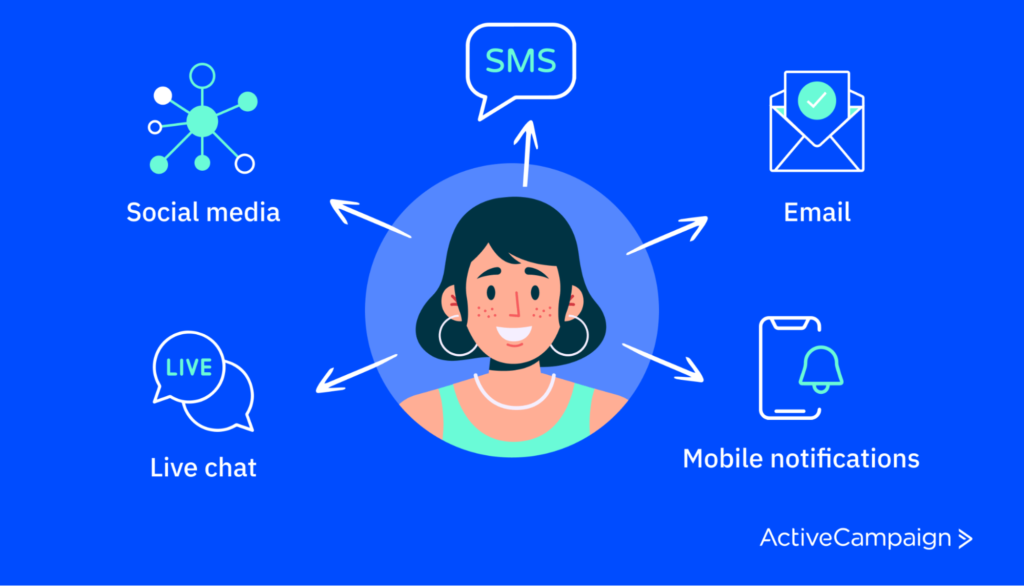
Customer engagement tools also help businesses utilize a wider range of customer data to create more personalized experiences.
The benefits of using a customer engagement platform
With 70% of consumers saying a company’s understanding of their individual needs influences their loyalty, customer experience must be at the core of your business strategy.
And yet, the customer journey is so much more of a squiggle than a straight line:
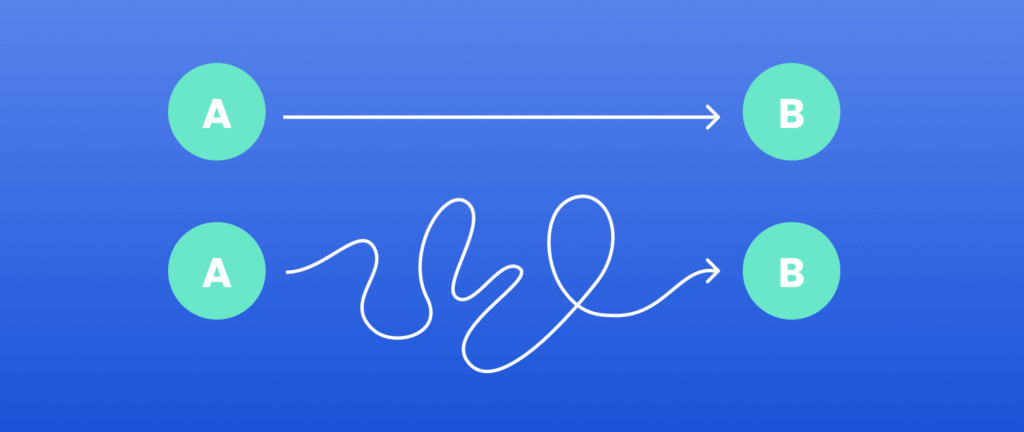
Whether chatting with your customers on your website, on Facebook, or via SMS, engagement tools make it easier for customers to engage with your business.
Without even needing to ask, and often before they even know they have a problem, customer engagement platforms make customers feel seen and heard with:
- Personalized recommendations
- Answers to commonly asked questions
- Resolutions to their problems
This is all done within the customer’s preferred digital channel, further increasing the likelihood of a positive experience.
Earning trust and loyalty has never been harder or easier. The competitive landscape has trained consumers to expect fast and personalized experiences, while engagement tools have made it easier for small businesses to engage customers more deeply than ever before.
The largest benefit of using customer engagement tools is automating a significant portion of the customer journey so businesses can find new ways to support, surprise, and delight their customers.
Examples of customer engagement
Customer engagement means optimizing interactions throughout the customer lifecycle to create better experiences, strengthen relationships, and generate more business.
Here are some examples of how a customer engagement platform allows you to improve the customer experience.
How L.G.R. World grew sales with customer engagement
L.G.R. World, a premium eyewear company, knew that not all of its customers had the same needs and interests. Engaging with them as if they were all the same was leaving money on the table. Revamping its customer engagement strategy increased ecommerce revenue by 143% and boosted transactions by 126%.
To better serve customers, L.G.R. World evaluated various touchpoints in the buyer journey (tracked with ActiveCampaign) and used them to segment audiences and create personalized emails, web experiences, and social media interactions.
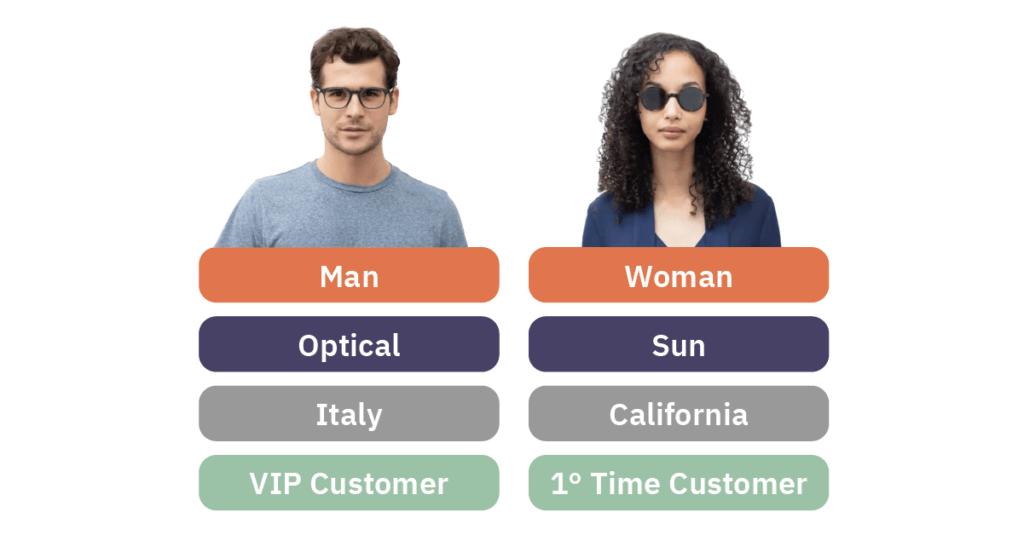
Using ActiveCampaign as its customer engagement platform, L.G.R. World could automate the segmentation process and personalized content delivery. By improving customer engagement through email, web personalization, and social media, the brand increased transactions and ecommerce revenue.
How Hipcooks increased retention with customer engagement
Hipcooks is a cooking school where regular people can connect with their inner chef. Its brick-and-mortar cooking schools in cities along the West Coast allow people to learn alongside others from their community. When Hipcooks began using personalized messages based on customers’ geographic location, it led to higher customer retention rates (70%).
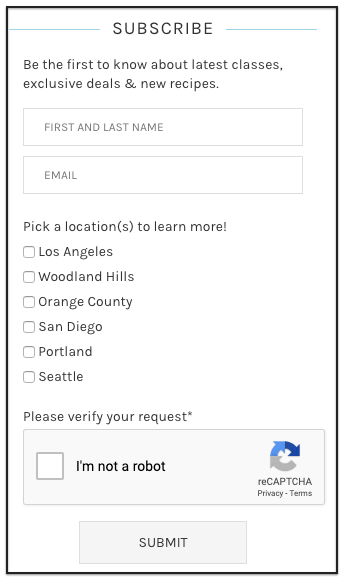
Thanks to ActiveCampaign’s customer engagement platform, Hipcooks could quickly pivot to marketing its virtual events when COVID-19 made in-person classes impossible. The right customer engagement platform makes it easier to communicate with customers when you’re working with unexpected challenges.
How to choose a customer engagement platform
Because engagement can mean so many things, it’s easy to get overwhelmed when choosing a platform. Here are 3 important factors to focus on as you consider different customer engagement tools.
Features
The 4 pillars to creating an incredible customer experience are:
- Automation: Execute your marketing strategy continuously with technology.
- Segmentation: Track and coordinate the information you have on your customers to customize their experience.
- Personalization: Create a unique experience for every single customer.
- Orchestration: Create a more connected customer experience by bringing together data from multiple platforms.
As you review platform features, ask how they will enable you to build these pillars into your customer experience. For example, how do the features help you personalize different parts of the customer experience? Top customer engagement platforms allow for messaging across multiple marketing channels, such as live chat, SMS, and social media.
Additionally, by allowing customers to self-serve, the best engagement platforms enable customers to get answers to their questions faster. This reduces your time on the phone or in your inbox, supporting repetitive issues.
Analytics and tracking
If you want to improve your customer engagement, you need a platform that allows you to measure your performance accurately.
Your customer engagement software should offer:
- Real-time analytics and dashboards
- Customer engagement tracking across digital channels
- Insights to help you make data-informed decisions
Look for a customer engagement platform that unifies all of your customer data, giving your team a 360-degree view of the user.
Scalability
If all goes according to plan, your business will only grow in the coming years. That’s why it’s important to consider how a platform will serve you now and in the future.
Ask yourself: will this platform meet my needs as my business grows? And does it remain affordable and effective with larger customer bases?
Top 5 customer engagement platforms
Now that you know what to look for, we’ve rounded up 5 top customer engagement platforms you should consider.
1. ActiveCampaign
ActiveCampaign is a robust customer engagement and marketing automation tool. More than 150,000 businesses use it, ranging from one-person shops to enterprise companies.
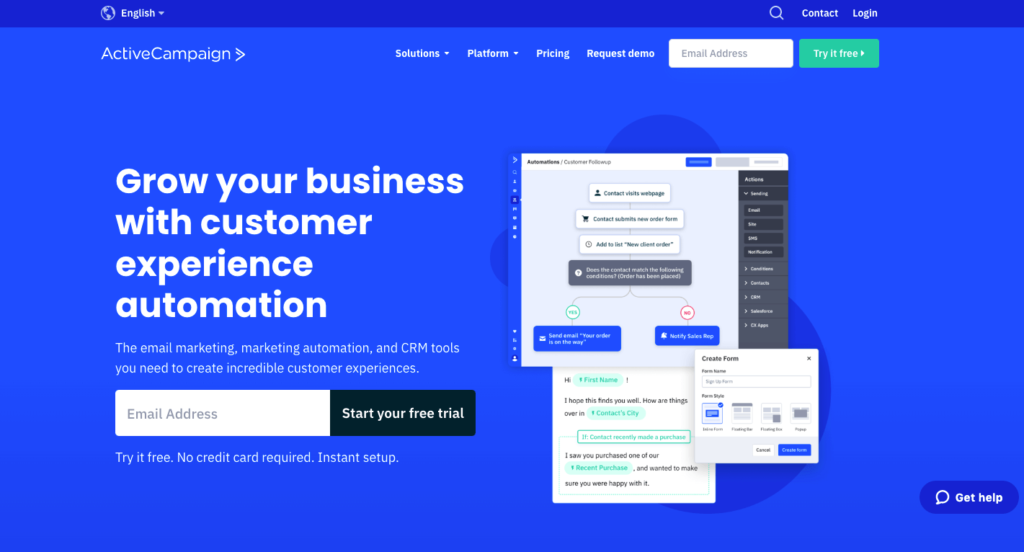
Standout features
- One-to-one email automations: ActiveCampaign allows you to incorporate one-to-one personalized emails into your sales engagement sequences.
- Engagement scoring: Like lead scoring, you can use engagement scoring to identify your most engaged customers and nurture those relationships.
- Dynamic content: You can tailor the same email message to include different content, determined by customer preferences.
- Advanced reporting: See which automations and customer interactions are working and tweak those that aren’t.
Who should use ActiveCampaign
ActiveCampaign empowers you to provide the right content to the right customer at the right time and automate the process. We have plans for businesses of all sizes, but our customer engagement platform is most helpful for small businesses looking for an easy-to-use tool to optimize the customer experience.
[free-trial headline="Automate Your Customer Engagement" description="Get started today managing and automating your customer engagement with a 14-day free trial of ActiveCampaign."]2. Salesforce
Salesforce is a well-known customer relationship management platform with customer engagement features.
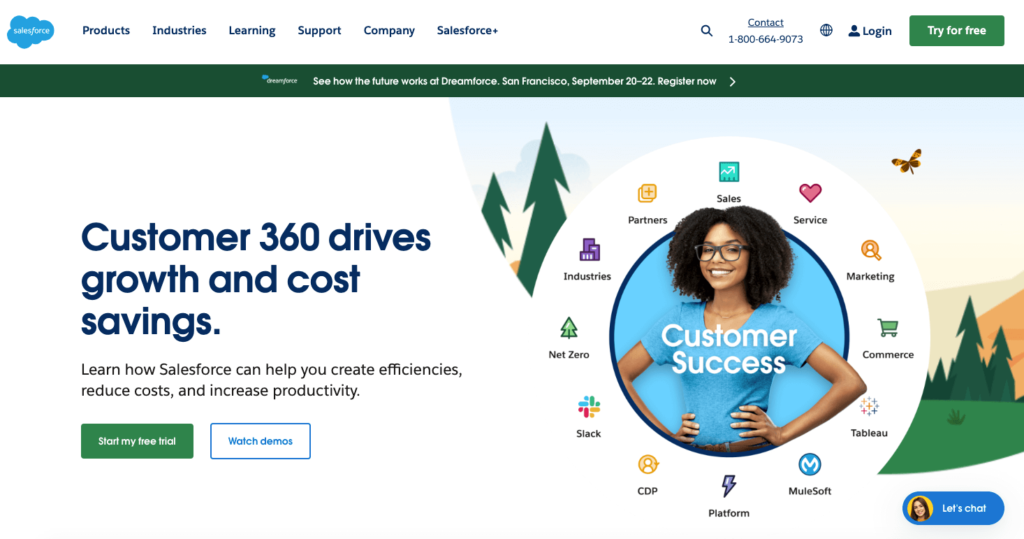
Standout features
- Personalized advertising: Use customer data to send them the right advertising across different channels.
- Loyalty management: Customer engagement continues long after the first purchase. Salesforce allows you to implement and manage a customer loyalty program.
- Facebook leads: You can automatically transfer leads from Facebook into Salesforce for continuing engagement.
Who should use Salesforce
Because of its cost and complexity, Salesforce is best suited for mid-market and enterprise businesses. It can be very valuable for organizations with a massive database of contacts.
3. Twilio
Twilio’s customer engagement software is designed to bring personalized engagement to various channels.
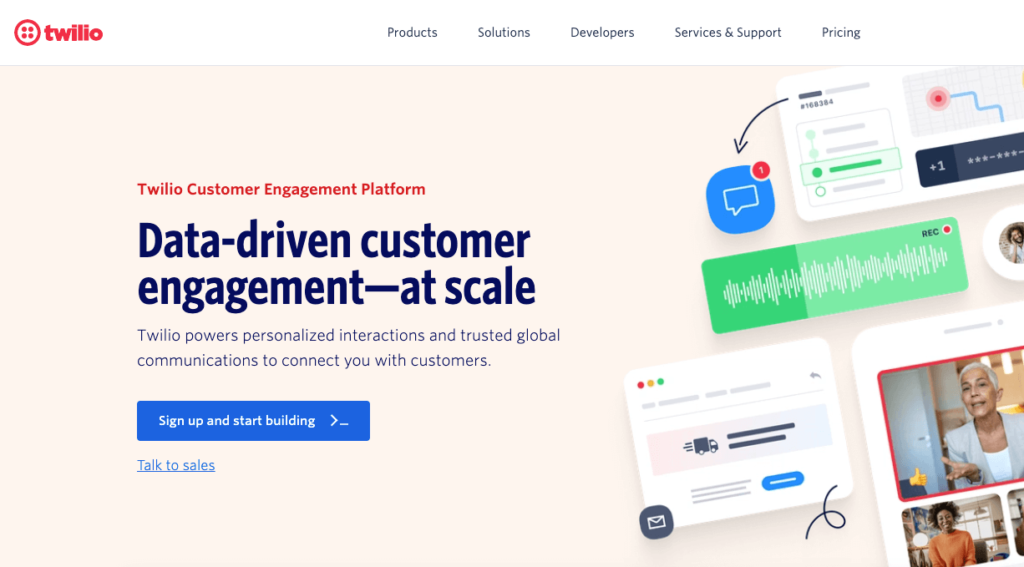
Standout features
- Voice, video, and text messaging: Twilio has APIs to allow you to execute customer engagement beyond your email and website, reaching people on their preferred channels.
- Twilio Frontline: Twilio Frontline allows your sales team to take a mobile-first approach to one-to-one engagement.
- Intelligent engagement: Use customer behavior to determine their preferred communication channels and build on previous interactions.
Who should use Twilio
If SMS and voice messaging are especially important for your brand, Twilio could be the right fit. It is most popular among software and IT businesses.
4. Zoho
Zoho offers a suite of various business software, including customer relationship management and a marketing platform.
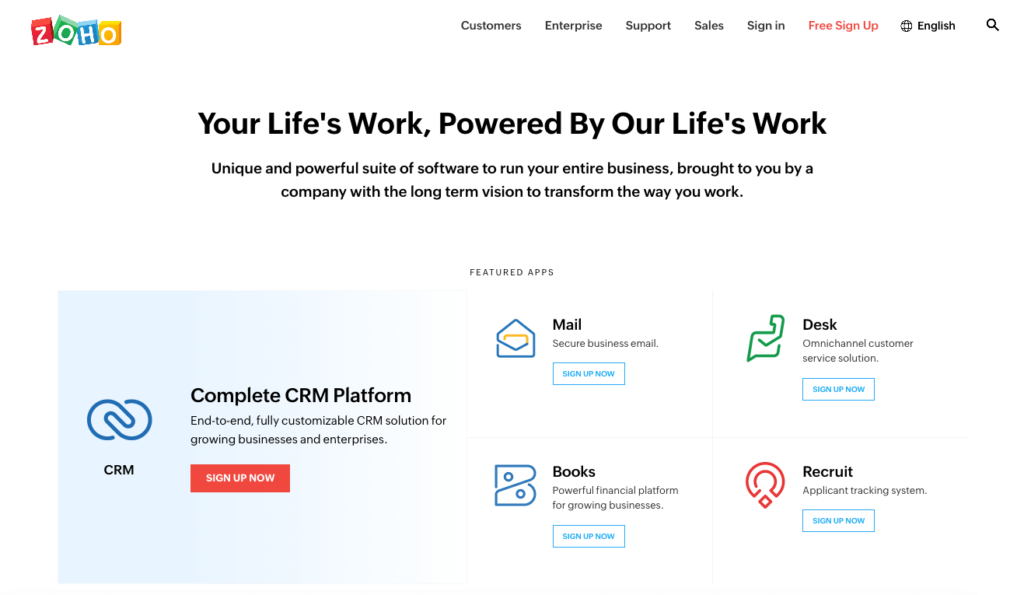
Standout features
- Customer segmentation tags: Segmentation is a key part of customer engagement, and Zoho’s tagging feature allows you to sort records by any characteristic you like.
- Custom lead scoring: Zoho’s lead scoring feature can be customized to fit your business needs and buying cycle.
- Event management: Zoho’s CRM is set up to bridge the gap between in-person event interactions and the ongoing follow-up process.
Who should use Zoho
Zoho can be a good fit for small and mid-market businesses whose sales cycle includes digital and in-person engagement.
5. Iterable
Iterable is a cross-channel marketing platform designed to facilitate engagement throughout the customer journey.
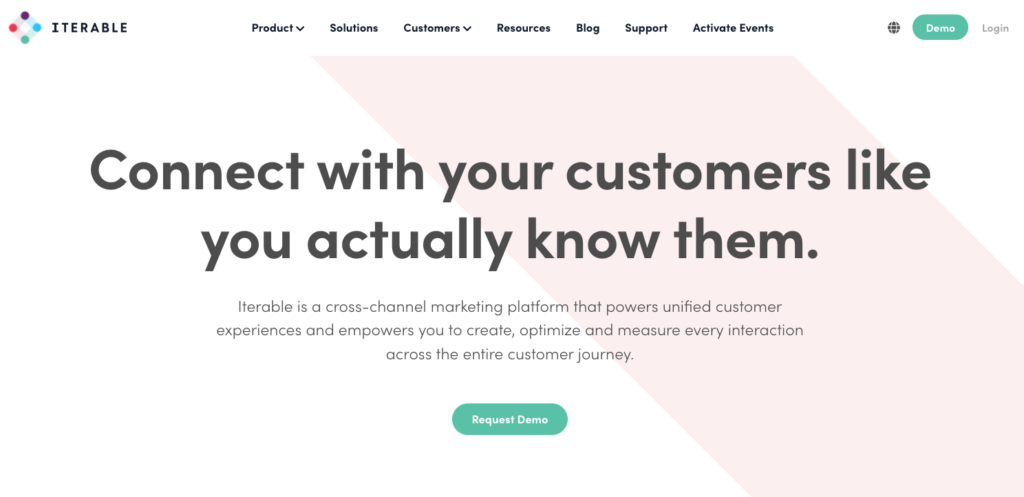
Standout features
- Granular customer segmentation: Iterable allows you to build ultra-specific audiences by letting you segment based on minute customer interaction details.
- Dynamic content: To tailor your messages to be most relevant to each recipient, customer data is used to populate templates with the right content and imagery.
- Workflow Studio: Use the Iterable Workflow Studio to create customer engagement journeys that incorporate push notifications and SMS messages, among other channels.
Who should use Iterable
Iterable is best for brands looking to create a unified customer journey across several channels. It’s most popular among mid-market companies.
Frequently asked questions
Here we answer a few of the most common questions businesses have about customer engagement platforms.
What is the role of customer engagement?
Customer engagement is an important part of the sales process and the post-sales relationship. Interactions across email, your website, and other channels build trust and improve the overall customer experience.
Whether you’re first connecting with a new contact, nurturing a lead, or following up on a customer service request, how you engage with customers affects your ability to close and retain business.
What is a customer engagement model?
A customer engagement model is a brand’s approach to building and nurturing customer relationships. Companies might develop different customer engagement models for different customer journey stages. For example, you might have a different strategy for engaging cold leads than retaining and upselling an existing customer.
How does a customer engagement platform differ from a CRM?
While a customer engagement platform and a customer relationship management system (CRM) have much in common, they’re not the same. A CRM’s primary purpose is to collect and store information about your contacts (both leads and customers). It allows your sales, marketing, and customer service teams to share details about the relationship.
A customer engagement platform is a tool that enables you to interact with and engage with customers. That means it might have features that allow you to segment your audience, implement personalization, and create marketing workflows.
That being said, many platforms are blurring the lines between a CRM and a customer engagement platform, offering features of both tools.
Cultivate and automate customer engagement
A business can create deep emotional connections with customers by engaging with them on the channels they like most. New opportunities emerge every day to find new customers and earn repeat business from current customers.
Choosing the right customer engagement platform for your business can help you reach more people, provide better customer experiences, and retain more customers for the long haul. When you add automation to this, you can amplify the efforts of even a small team.
Ready to upgrade customer engagement in your business? Learn more about ActiveCampaign’s sales engagement tools.